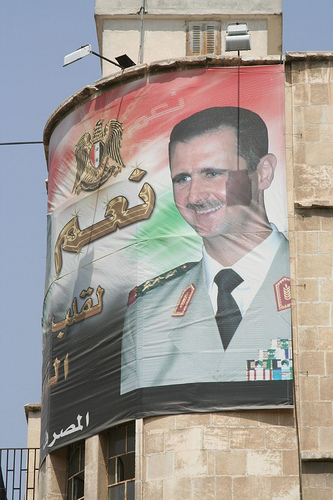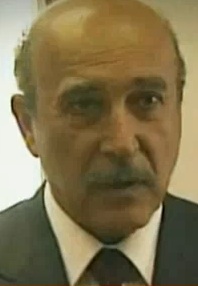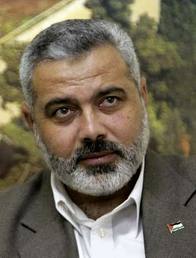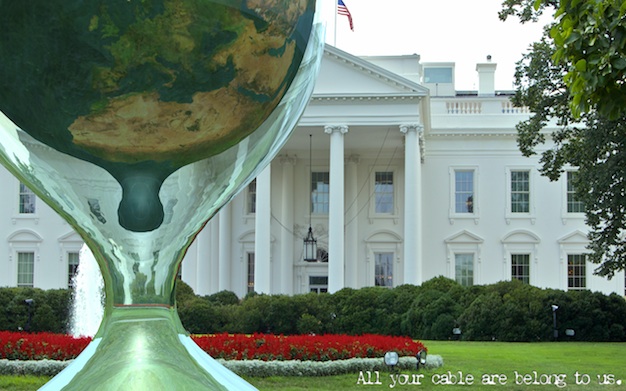
Cables released by WikiLeaks on Syria show a State Department eager to repair relations with Syria, which were in extreme ruin when the Bush Administration left power. They show the US government was eager to double their efforts at targeting Syria’s interest in developing nuclear capabilities.
The cable 09DAMASCUS142 from February 19, 2009, shows US officials wanted to find a way to break through Syrian media, which is tightly controlled by the government, and get its own propaganda into the country so Syrians could hear what the US considered to be the truth on US-Syria relations.
Officials were concerned that “savvy journalists” had become “adept at self-censorship.” And, thus, the truth about Syria’s nuclear activities was not being reported:
Congressional delegation meeting in June 2008 detailed in cable
 A recently released cable describes three congressional delegation meetings with Egyptian President Hosni Mubarak, Egyptian Vice President Omar Suleiman and Foreign Minister Aboul Gheit. The congressional delegation present at the meetings included Rep. Gary Ackerman (D-NY), Rep. Sheila Jackson-Lee (D-TX), Rep. Thad McCotter (R-MI), Rep. Randy Neugebauer (R-TX), Rep. Russ Carnahan (D-MO), Rep. Al Green (D-TX), and professional staff members David Adams, Jamie McCormick and Howard Diamond.
A recently released cable describes three congressional delegation meetings with Egyptian President Hosni Mubarak, Egyptian Vice President Omar Suleiman and Foreign Minister Aboul Gheit. The congressional delegation present at the meetings included Rep. Gary Ackerman (D-NY), Rep. Sheila Jackson-Lee (D-TX), Rep. Thad McCotter (R-MI), Rep. Randy Neugebauer (R-TX), Rep. Russ Carnahan (D-MO), Rep. Al Green (D-TX), and professional staff members David Adams, Jamie McCormick and Howard Diamond.
The meetings described in 08CAIRO1416, on CODEL Ackerman (“congressional delegation”) posted by Norwegian newspaper Aftenposten focused on Israeli-Palestinian developments (the building of a “calming period”), Egypt’s regional relations, and human rights criticisms of Egypt.
On Sunday, the Palestinian Health Ministry in Gaza warned of an impending 'public health disaster', reported first on WL Central here. In a press release on the organization's Web site, the Ministry states that the situation could include the death of hundreds of people, including cancer patients, those with tumors, and those in need of both kidney dialysis and intensive care.
Gaza War
Gaza's long-suffering has increased exponentially since Operation Cast Lead in December 2008, when Israel launched air attacks on Gaza in response to rocket and mortar fire by Hamas. The incident was preceded by an Israeli incursion into Gaza in November 2008 "to destroy what Israel said was a tunnel on the Gaza-Israel border dug by militants to infiltrate into Israel and abduct soldiers." (Source: Wikipedia)
Cable 08TELAVIV1984, released by Wikileaks today, is headlined at Uruknet "New Wikileaks cable shows 2008 war on Gaza was unprovoked: Israel knew Hamas was enforcing ceasefire" referring to the 2008 massacre that resulted in approximately 1,400 Palestinians killed in 22 days, an operation in which Israeli soldiers had orders to "cleanse" entire neighbourhoods, orders which they carried out. That is evident in the first part of the cable, where MOD Arab Affairs Adviser David Hacham, says Suleiman was keeping the pressure on Hamas, but the Israelis were frustrated at Hamas' 'stalling tactics' - Hamas was demanding Egyptian guarantees that Israel would not attack Gaza once Shalit was released. Regarding the Tahdiya, Hacham said Barak stressed that while it was not permanent, for the time being it was holding. There have been a number of violations of the ceasefire on the Gaza side, but Palestinian factions other than Hamas were responsible. Hacham said the Israelis assess that Hamas is making a serious effort to convince the other factions not to launch rockets or mortars.
The cable also returns to Egypt's anti-smuggling efforts, enforced by Israel and the US, and this time Israel has "decided to praise Egypt's performance publicly both in genuine acknowledgement of some improvements in destroying tunnels and in order to show the Egyptians that Israel was capable of praising as well as criticizing them. In private, however, Barak also pushed the Egyptians to do more, particularly in terms of stopping the smuggling well before the arms reach the Gaza border."
Today, Wikileaks released two more cables detailing Israeli pressure on the residents of Gaza Strip. As reported by WL Central here, the closure of tunnels bringing basic supplies into the Gaza Strip from Egypt have caused an urgent humanitarian crises for the people of Gaza. But US state cables show Israel pressuring the US to link aid to Egypt with the complete closure of those tunnels and the prevention of any supplies reaching Gaza through Egypt. Egypt's new vice president's involvement is also discussed.
In November of 2007, Israel Security Agency (ISA) Director Yuval Diskin met with US officials to discuss the 'problem' of supplies moving from Egypt to the Gaza Strip. In 07TELAVIV3258 Diskin outlines "a growing crisis in Israeli-Egyptian relations over smuggling across the Gaza border". Diskin told the US representatives that the ISA had, on several occasions, provided Omar Suleiman, Chief of Egyptian Intelligence Services, with detailed intelligence on the names of smugglers. In 2005, Diskin said he met personally with Suleiman in Egypt, at which time Suleiman promised personally to take responsibility for "cleansing the Sinai." Despite these promises, and Israeli offers to initiate joint operations, Diskin said Egypt has not acted to eliminate the smuggling networks. In Diskin's view, there is a core policy problem, in that the Egyptians view themselves as the primary mediator between the Israelis and Palestinians, and are careful not to alienate either side. "This is not possible with Hamas in Gaza," insisted Diskin.
 The Norwegian newspaper Aftenposten has published a set of cables that shed light on Omar Suleiman’s willingness to serve the interests of Israel. The man recently appointed as vice-president of Egypt, according to a cable from 2005, was willing to help former head of security in the Israeli Defense Ministry Amos Gilad by guaranteeing there would be no democratic elections in Gaza in 2006. He was also willing to help Israel better manage the Rafah crossing between Gaza and Egypt.
The Norwegian newspaper Aftenposten has published a set of cables that shed light on Omar Suleiman’s willingness to serve the interests of Israel. The man recently appointed as vice-president of Egypt, according to a cable from 2005, was willing to help former head of security in the Israeli Defense Ministry Amos Gilad by guaranteeing there would be no democratic elections in Gaza in 2006. He was also willing to help Israel better manage the Rafah crossing between Gaza and Egypt.
Cables released also reveal that a key motive for opposing Hamas was a fear that the Muslim Brotherhood would be emboldened. 05TELAVIV5864 details a meeting that Gilad wanted kept secret. Gilad talked about his fear of the Palestinian uprising movement Hamas, which was expected to get a large amount of the vote in the democratic elections in January 2006. Gilad was afraid that Hamas would win the election and that a Hamas win would "destroy everything."
 Hundreds of Hamas supporters in Gaza City protested in the streets on February 3 in support of the Eyptian revolutions and against Egypt's president Hosni Mubarak with the apparent tolerance or encouragement of the Hamas government. But later this week, a group of journalists and bloggers who organized their own protest had their protest broken up. Six women and eight men were arrested, and two of the women were beaten.
Hundreds of Hamas supporters in Gaza City protested in the streets on February 3 in support of the Eyptian revolutions and against Egypt's president Hosni Mubarak with the apparent tolerance or encouragement of the Hamas government. But later this week, a group of journalists and bloggers who organized their own protest had their protest broken up. Six women and eight men were arrested, and two of the women were beaten.
In Ramallah rallies were also broken up before they started. The Palestinian Authority police beat protesters with clubs and arrested two at a rally for Egypt in front of the Egyptian embassy on Sunday. "Our rally was simply in support of Egypt," one protester told Ma'an by phone, "we said nothing against the PA, we were not even out in the street." Earlier the same day, the Palestinian Authority had organized a rally in support of Mubarak which accused Egyptian opposition leader Mohammed El Baradei of being a CIA agent. The pro-Mubarak rally attracted a few dozen, the rally for the Egyptian people hundreds.
The rallies now appear to have changed from simply supporting Egypt to including calls for reform in Gaza. A Facebook page appeared on January 28 calling for a revolution in Gaza and naming February 11 a day of protest against the Hamas government. Four days later, another page was set up on Facebook, calling for a revolution in Ramallah and the ouster of President Mahmoud Abbas.
 The Telegraph: Israel's secret hotline to the man tipped to replace Mubarak
The Telegraph: Israel's secret hotline to the man tipped to replace Mubarak
"The new vice-president of Egypt, Omar Suleiman, is a long-standing favourite of Israel's who spoke daily to the Tel Aviv government via a secret "hotline" to Cairo, leaked documents disclose."
El País: Estados Unidos cree que nunca se sabrá si el expresidente chileno Eduardo Frei fue asesinado (The United States believe it will never be known if the Chilean ex-president Eduardo Frei was assassinated)
"El que fuera máximo mandatario entre 1964 y 1970 murió tras someterse a una operación rutinaria de hernia en la que contrajo una infección bacteriológica. (The one who was maximum leader of Chile between 1964 and 1970 died after a routine hernia surgery in which he got a bacteriologic infection.)"
El País: SCENESETTER FOR VISIT OF SPECIAL ENVOY MITCHELL TO DAMASCUS
Amidst reports from newspapers like the Telegraph that secretary general of the Arab League, Amr Moussa, might be someone who takes over for President Hosni Mubarak, it seems worthwhile to look at what released WikiLeaks cables reveal about the US perception of Moussa. The US has close ties with Egypt and gives much military aid to Egypt. Although the people in Egypt revolting against Mubarak have the upper hand right now, any leader appointed to lead Egypt would likely have some support from the US.
At least since 2006, the issue of who would succeed Mubarak has been a foremost issue for the US. And, as indicated by 09CAIRO874, the US has noted Moussa could be a possible candidate for taking over the presidency:
US State cable 2010-02-23 10DOHA70 details a February 14, 2010 meeting between Senator John Kerry and the Amir of Qatar. In the meeting, the Amir stresses the importance of Israel's return of the Golan Heights to Syria. Hamas "for sure," he said, will accept the 1967 border but will not say it publicly so as to lose popular Palestinian support. The Amir accuses Egypt of delaying an agreement between Israel and Palestine to extend their own role. "According to the Amir, Fatah and Hamas agreed on a memorandum of understanding, but the Egyptians wanted it changed." The Amir offers to deliver a message from the US to Iran.
Syria
US state cable 2010-02-24: 10DOHA71 outlines Senator Kerry's meeting with Qatar's Prime Minister, Hamad bin Jassim Al Thani (HBJ) on February 13, 2010. In the meeting, HBJ stresses that it is a mistake to exclude Hamas from Israeli-Palestinian negotiations, equates Egypt to a physician with one patient, and accuses Egypt of having a vested interest in dragging out the talks for as long as possible. He also warned against a US military action against Iran.
HBJ told Senator John Kerry February 13 that "everyone in the region" seems to have a separate plan for moving ahead on the Israeli-Palestinian dispute when only one plan was needed; a plan that both the Israelis and Palestinians would accept and finalize. HBJ underscored that it is a mistake to ignore Hamas in seeking a lasting agreement. Saying this does not mean that Qatar expresses a preference for Hamas, but the Palestinian Authority (PA) cannot sign off on an agreement on behalf of the Palestinians where open divisions exist.
In a statement to the press, Saeb Erekat, chief PLO negotiator, spoke out against the reports based on the Palestine Papers in Al Jazeera and the Guardian. "In the past few hours, a number of reports have surfaced regarding our positions in our negotiations with Israel, many of which have misrepresented our positions, taking statements and facts out of context. Other allegations circulated in the media have been patently false."
While Al Jazeera suffered from about 50 protesters smashing the windows and security cameras of their TV studios, there may have been long term implications for the Palestinian leadership.
Speaking to journalists in Cairo, the Palestinian president, Mahmoud Abbas, said the public had been misled by the reports. "We say very clearly, we do not have secrets."
The citizens of Gaza remained unconvinced.
Earlier this week, Israel was accused of ethnic cleansing of Israeli Arabs based on material in the Palestine Papers (summarized here and here). In the Palestine Papers, documents show Israeli negotiators wanting to cut out Arab occupied parts of Israel and give them to Palestine as they were considered "Palestinian" parts of Israel. Other documents discuss the Palestinian diaspora and Israel's refusal and Palestine's inability to accept them as citizens. US Secretary of State Condoleeza Rice suggested they should be transported to Chile and Argentina.
Yesterday, Nurit Kedar aired a report on Channel 4 News telling of a different kind of ethnic cleansing.
Part 1 of the Palestine Papers summary is here. The summary concludes with the last documents released on January 26th, and Al Jazeera's editorials on the documents.
Private exchanges between Palestinian and American negotiators in late 2009, when the Goldstone Report was being discussed at the United Nations.
PA stonewalled the Goldstone voteThe UN Human Rights Council was to vote on a resolution supporting the Goldstone Report, the UN’s probe of war crimes committed during Israel’s war in Gaza, on October 2, 2009. The Palestine Papers document exchanges between the US, Israel and the Palestinian Authority during that period. The Palestinian Authority's chief negotiator Saeb Erekat, looking for an agreement he could politically agree to, was convinced by the US, who were determined that Obama's promises of renewed negotiations would be met, that renewing negotiations was in their best interests.
During a series of meetings, Erekat presses for some guidelines or foundations for the discussion "SE cautioned that if the US announced negotiations and there is no agreement on these issues, there will be a disaster." The US refuses to provide any, making clear that for them, the process is the important object. "Undoubtedly you've perceived the sense of urgency of the President. He attitude was consistent: we need to proceed to negotiations ... Regardless of the package with the Israelis, we are not asking you to agree to it. So there is no risk of acquiescence."
On January 23, Al Jazeera announced their possession of 1,684 files of confidential documents related to the Israeli-Palestinian conflict, and with the release of these documents, they launched their new Transparency Unit. They released the Palestine Papers and reported on their contents between January 23-26th, 2011. The documents include:
These accounts of high level exchanges and strategy papers cover a period from 1999 to 2010. As promised by Al Jazeera, they have revealed new details regarding:
The Palestinian Authority’s willingness to concede illegal Israeli settlements in East Jerusalem, and to be “creative” about the status of the Haram al-Sharif/Temple Mount.
Al Jazeera launches Transparency Unit:
Launched in January 2011, the Al Jazeera Transparency Unit (AJTU) aims to mobilize its audience - both in the Arab world and further afield - to submit all forms of content (documents, photos, audio & video clips, as well as “story tips”) for editorial review and, if merited, online broadcast and transmission on our English and Arabic-language broadcasts. ...
From human rights to poverty to official corruption, AJTU will fairly evaluate and pursue all leads and content submitted, without geographical, political, cultural, or religious bias.
The German language website Welt Online continued publication of WikiLeaks cables critical of Turkey, in their bid to "Break the WikiLeaks Cartel". According to cables cited today, the opening of the PLO Embassy in Turkey was only an excuse for Abbas' visit in 2009, and Israel considers Turkey to be "lost to the west".
The cables document how not only the USA and Israel, but also the Palestinian Authority in Ramallah were concerned with Turkey's silent support for Hamas, which the PLO official quoted in the cable of June 3, 2009 called "very dangerous". Turkey's ambivalent relationship to Hamas, while nothing new, required Turkish officials to "talk out of both sides of their mouth" when dealing with American officials. The U.S. Congress' anger is is clearly visible in the cables. This push-me pull-you continued well into 2009, when U.S. Ambassador James F. Jeffrey reported on February 9th that President Gül and especially Foreign Minister Babacan were taking extra care to deal with the "extremely critical" remarks that Erdogan had made towards Israel in order to repair the "traditionally strong relationship between Israel and Turkey".
The cables document the further deterioration of the relationship, to the degree where the Israeli Ambassador to Ankara, Gabi Levy, called Erdogan a fundamentalist who "hates us with religious fury". Whereupon the Americans soberly confirm that their contacts inside and outside of the Turkish government are of the opinion that Erdogan probably "just hates Israel".
Der Spiegel: Amerikaner lästern über Chaos-Konzern Gazprom (Americans gossiped about Gazprom chaotic corporation)
"Gazprom sollte Russland wieder zur Supermacht machen, Manager träumten vom "wertvollsten Unternehmen der Welt". Doch Geheimberichte aus Moskaus US-Botschaft zeichnen ein anderes Bild: Die Amerikaner halten den Megakonzern für chaotisch organisiert - und korrupt. (Gazprom should make of Russia a superpower again, or so dreamed the manager of the "world most valuable business". Though secret reports by the American embassy in Moscow showed a different image: the Americans accused the mega-corporation of being chaotic and corruptly organized.)"
Der Spiegel: US-Diplomaten wollten EU für Genmais-Blockade bestrafen (American diplomats wanted to punish the EU for commercial blocking of genetically modified sweetcorn)
"Die von WikiLeaks enthüllten Botschaftsdepeschen zeigen, wie die USA die Gentechnik in Europa vorantreiben wollten: Ein US-Botschafter in Europa verlangte von Washington, genmaisblockierende EU-Staaten unter Druck zu setzen - und die "schlimmsten Übeltäter" zu bestrafen. (The secret diplomatic cables exposed by Wikileaks show how the United States wanted to push forward the genetic engineering in Europe. An American diplomat in Europe requested from Washington to establish a commercial blocking against the States of the EU in order to punish the "worst offenders".)"
Le Monde: WikiLeaks : les Etats-Unis n'avaient pas cru possible un coup d'Etat au Honduras (The United States did not believe a coup in Honduras was possible)
Peninsula has posted a partial transcript of an interview in Arabic with Julian Assange. Here is the full interview with Ahmed Mansour for Al Jazeera's 'Without Borders'.
“There are 3,700 files related to Israel and the source of 2,700 files is Israel. In the next six months we intend to publish more files depending on our sources,” said Assange in the nearly one-hour interview telecast live from the UK.
“The Guardian, El-Pais and Le Monde have published only two percent of the files related to Israel due to the sensitive relations between Germany, France and Israel. Even New York Times could not publish more due to the sensitivities related to the Jewish community in the US,” he added.
The United States has been briefing foreign governments on the content of an expected upcoming WikiLeaks release of diplomatic cables, in an apparent attempt at preemptive damage control:
Sydney Morning Herald: US briefs Canberra on secret files
"Australia has been briefed by the US on the imminent release by WikiLeaks of a huge tranche of diplomatic cables that sources say contain allegations of corruption and embarrassing behaviour by politicians worldwide."
Read more
The Globe and Mail: U.S. warns Ottawa about fallout from pending WikiLeaks release
"The U.S. government has notified Ottawa that the WikiLeaks website is preparing to release sensitive U.S. diplomatic files that could damage American relations with allies around the world.
U.S. officials say the documents may contain accounts of compromising conversations with political dissidents and friendly politicians as well as activities that could result in the expulsion of U.S. diplomats from foreign postings."
Read more
Sky News: Washington Braced For Millions Of Leaks
"US embassies around the world are contacting allies, as Washington braces itself for the leak of millions of diplomatic documents.[...] Sky News understands the US ambassador to the UK, Louis Susman, has been seen going into Downing Street and the Foreign Office for what one source called 'contingency planning'."
Read more
NRK: USA advarer om nytt WikiLeaks-slipp fredag
"We have received today a general briefing from the American embassy to the effect that WikiLeaks has announced that they will post new documents tomorrow," writes Martin Lerberg Kopstad, spokesman at the Norwegian Ministry of Foreign Affairs, in an e-mail to nrk.no.
Read more
Politiken: USA advarer Danmark om ny WikiLeaks-læk
"'The Foreign Ministry has been contacted by the United States on WikiLeaks' forthcoming publication. We can not go into details on the content of the conversation,' the Foreign Ministry told politiken.dk.
The reason that Denmark is briefed by the Americans is that the next leak can be very embarrassing not only for the U.S. but also the Danish and many other governments around the world."
Read more
Ha'aretz: Israel, U.S. tense as WikiLeaks sets to release classified bilateral communiqués
"The United States Embassy in Tel Aviv has informed the Foreign Ministry in Jerusalem that the whistle-blowing website WikiLeaks was planning on releasing hundreds of thousands of American diplomatic cables, some of which might deal with Israel-America relations."
Read more
CBC: WikiLeaks: Should sensitive diplomatic files be released?
CBC put the question to a reader vote. Over 85% voted "yes" as of the time of this update.
Read more
Politiken: Enhedslisten: WikiLeaks-stifter skal bo i København
In other news, Denmark's Unity alliance would like to extend Julian Assange an invitation to live in Copenhagen, reports Politiken: "WikiLeaks is fighting a brave fight for freedom of expression. And they are under immense pressure from the world's warring nations. If we are serious about being a Refuge Network, sending an invitation to Julian Assange would be an obvious step." Copenhagen's Refuge Network System has as its objective to protect persecuted writers.
Read more
Theme by Danetsoft and Danang Probo Sayekti inspired by Maksimer